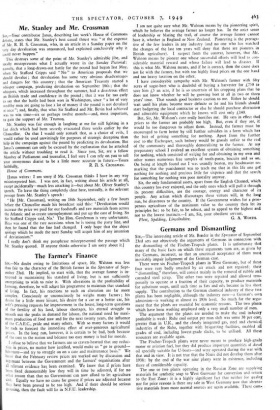The Farmer's Finance
Sta.—No doubt owing to limitations of space, Mr. Walston was less than fair to the character of the British farmer in the Spectator of Sept- ember 23rd. He implied, to start with, that the average farmer is in- terested in maintaining his standard of living, but is not sufficiently enterprising to wish to raise it. With alterations in the profitability of farming, therefore, he will adjust his programme to maintain that standard of living. In fact, his reactions to such an alteration arc far more complex. Consciously or. unconsciously he weighs many factors ; his desire for a little more leisure, his desire for a car or a better car, his wife's pressing requests for improvement in the house, long-term questions of the fertility of his land, labour shortages, his eternal struggle to smooth out the peaks in demand for labour, the national need for maxi- mum production of food now and for the next twenty years, the influence of the C.A.E.C., pride and many others. With so many factors it would be rash to forecast the immediate effect of over-generous agricultural Prices. In the long run, however, it is certain to be bad, both because of the cost to the nation and because too easy money is bad for morale.
I refuse to believe that we farmers are so craven-hearted that any reduc- tion in prices, no matter how justified, would make us " go to ground- hibcrnate—and try to struggle on on a care and maintenance basis." We know that the February review prices are worked out by discussion and argument between the Government and the farmers' organisations after all relevant evidence has been examined. We know that if prices have been fixed demonstrably low they will in time be adjusted, if for no other reason than that no Government can now afford to let agriculture sink. Equally we have no cause for grouse if prices are adjusted because they have been proved to be too high. And if there should be serious gaausing, then the fault will lie in N.F.U. leadership. I am not quite sure what Mr. Walston means by the pioneering spirit, which he believes the average farmer no longer has. In the strict sense of leadership or blazing the trail, of course the average farmer cannot have it, whether in England or Ncw Zealand. Pioneering is the preroga- tive of the few leaders in any industry (and no one who has watched the changes of the last ten years will deny that there are pioneers in British agriculture). I suspect from the context, however, that Mr. Walston means by pioneer one whose successful efforts will lead to con- siderable material reward and whose failure will lead to disaster. If this is what Mr. Walston means, and if he is correct, then the cause does not lie with the farmer, but with too highly fixed prices on the one hand and too heavy taxation on the other.
I have considerable sympathy with Mr. Walston's farmer with fifty acres of sugar-beet who is doubtful of buying a harvester for £750 to save him £5 an acre, if he is so uncertain of his cropping plans that he does not know whether he will be growing beet at all in two or three years' time. That sounds good business caution to me. Either he should wait until his plans become more definite or he and his friends should start badgering the local contractor or else he should purchase alternative and admirable equipment which he knows will cost only £140.
But, Sir, Mr. Walston's cure really horrifies me. He says in effect that prices to the farmer are probably too high. But, even if they are, it would be too dangerous to adjust them. Instead, the farmer must be encouraged to farm better by still further subsidies in a form which has the bait of getting something for nothing. Apart from the further cos: to the Exchequer, such bribery would be grossly unfair to the rest of the community and thoroughly demoralising to the farmer. At my preparatory school I evolved an excellent system of obtaining something for nothing, which consisted of wriVng for and obtaining in my own and other names numerous free samples of tooth-paste, biscuits and so on. On being at length found out I was soundly beaten, my headmaster re- marking that the punishment was to teach me that in this life one got nothing for nothing and precious little for sixpence and that the search for something for nothing was poor morality anyway.
Sir, the only fundamental assets, apart from the English Channel, which this country has ever enjoyed, and the only ones which will pull it through its present difficulties, are the courage, energy and character of its people. Any action which discourages these virtues will, in the long run, be disastrous to the country. If the Government wishes for a pros- perous agriculture of the maximum value to the country then let its principles be: to be fair, to be robust, and to appeal to the highest and not to the lowest instincts.—I am, Sir, your obedient servant,






































 Previous page
Previous page